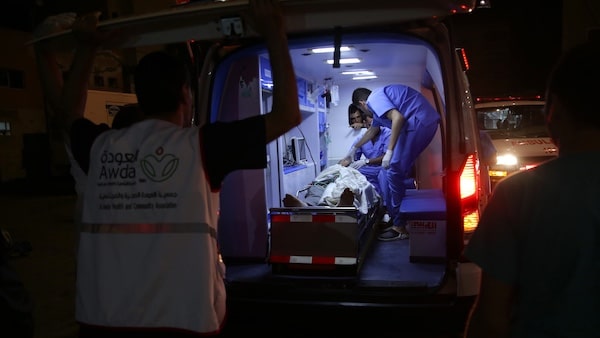A total collapse of hospitals in Gaza is unfolding minute by minute as fuel supplies fall below critical levels. The Palestinian Ministry of Health and the United Nations Relief and Works Agency for Palestine Refugees in the Near East (UNRWA) have announced that health facilities had supplies to last until the end of Wednesday, October 25 at the latest. However, dozens of health centers and hospitals have already been forced to suspend care provisions.
The flow of aid into Palestine remains slow and inadequate. Ministry spokespersons have stated that it is not enough to change the situation that has been evolving on the ground since the beginning of the bombardments of Gaza on October 7. According to a report issued by the Ministry of Health at the end of last week, at least 1,400 people, including 720 children, are still trapped under the rubble and in need of medical assistance. Roads remain blocked, and ambulances are unable to reach people who have been injured in the attacks.
The situation is untenable, according to health workers on the ground, and it will only become worse if nothing is done to prevent outbreaks of communicable diseases. Epidemics in Gaza are becoming more probable by the day due to the living conditions displaced people have been enduring over the past 17 days. While the Ministry of Health has stated that they are making it a priority to keep vaccination services, dialysis services, and labor and delivery wards operational, there is only so much that can be done in the current situation. According to Oxfam, the lack of water alone could lead to outbreaks of chickenpox, scabies, and diarrhea.
Even UNRWA spaces are not better equipped. According to a statement published on October 23 by AWDA association, the UN centers are coping with extremely limited resources. Hundreds of people have no choice but to use the same sanitation facilities, and personal hygiene products are largely unavailable. The problem is also impacting pregnant women, of which there are an estimated 50,000 in Gaza at the moment, according to UN estimations. Testimonies quoted by AWDA describe women in refugee camps delivering babies without medical assistance, supported by other women in the camp, as no other option exists.
Because of the large number of injuries caused by Israeli attacks, hospitals and health centers in Palestine are beyond their capacity to respond to an increase in communicable and preventable diseases that are certain to arise. Ahmed Muhanna, a physician and manager of two Al-Awda hospitals in northern Gaza, reaffirmed this assessment during a conversation with the Belgian media outlet De Wereld Morgen on October 19.
Hospital capacities are already stretched beyond limits. Health workers at Al-Shifa Hospital, the largest health institution of this kind in Gaza, with a capacity of 200 beds, are operating in the hallways due to the lack of space, as Muhanna mentioned during the interview. Experiences shared by nurses working in the hospital echo Muhanna’s concerns, with people lying on mattresses and cardboard along the halls. “We cannot discharge patients as they are scared to be bombed again and do not know where to go,” said a message by a nursing professor to colleagues abroad.
Initially, hospitals tried to cope by redistributing patients among themselves. But as Israel continues to bombard Gaza and the number of injured people grows by the hour, this is no longer a viable strategy. Thirteen days into the attacks, the stock of medicines and single-use products at the Al-Awda hospitals where Muhanna works was already concerning. The stocks, as Muhanna explained, could be enough for approximately “one month in a ‘normal’ war,” but not in this one.
“What is the difference this time, in this war? The level of aggression and the type of bombs used in this attack are terrible,” Muhanna said to De Wereld Morgen. When asked what the most pressing need the Al-Awda hospitals are facing, Muhanna stressed the urgency of receiving sufficient amounts of medical oxygen and particularly fuel.
The first aid trucks carrying fuel crossed into Gaza only on Sunday, October 22. Considering that the amount of aid being allowed into Palestine by Israeli Occupation Forces has been called “a drop in the ocean” by both activists and high-ranking health officials alike, and with hospitals in northern Gaza still out of their reach, it is impossible to imagine a continuation of health care provision without an immediate ceasefire and scaled-up delivery of essential supplies.
Watch the full interview with Ahmed Muhanna on De Wereld Morgen.
People’s Health Dispatch is a fortnightly bulletin published by the People’s Health Movement and Peoples Dispatch.

